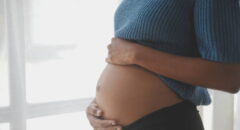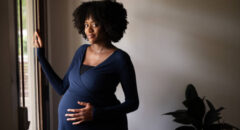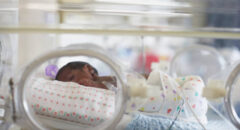 Netflix & Learn might not sound quite as cool as the more popular phrase "Netflix & Chill," but anytime a film can entertain and educate it's worth a watch. "Breathe," executive produced by Angela Burgin Logan, portrays Angela's true story of a near fatal pregnancy after her doctor failed to diagnose her with preeclampsia, a dangerous pregnancy complication that occurs in 5-8 percent of all pregnancies and is a leading cause of maternal deaths.
Netflix & Learn might not sound quite as cool as the more popular phrase "Netflix & Chill," but anytime a film can entertain and educate it's worth a watch. "Breathe," executive produced by Angela Burgin Logan, portrays Angela's true story of a near fatal pregnancy after her doctor failed to diagnose her with preeclampsia, a dangerous pregnancy complication that occurs in 5-8 percent of all pregnancies and is a leading cause of maternal deaths.
READ: Blood Test May Help Rule Out Pregnancy Complication
In the film, Angela (portrayed by Jazsmin Lewis) experiences many of the common symptoms of preeclampsia - elevated blood pressure, headaches, shortness of breath - only to have her concerns downplayed and dismissed by her doctor. Black women die 4 times faster than other populations from maternal health complications and Angela believes taking her story to the big screen was critical because Black women are often omitted from visual narratives on maternal health complications.
"I am proud that my film “Breathe” is the first dramatic film to make the issue of preeclampsia and maternal health complications for African-American women its central theme," she shared with BlackDoctor.org. "Reading about a statistic and seeing it are vastly different to how we will process, internalize and react."
The movie, which is currently streaming on Netflix, is as much about Angela's miraculous story of surviving with only a 20 percent chance to live as it is a cautionary tale for women when it comes to getting the healthcare they deserve.
BlackDoctor.org recently went behind-the-scenes with Angela to learn how she's helping other women to save their own lives.
BlackDoctor.org (BDO): With this being your first pregnancy, did your doctor or anyone ever talk to you and your husband about possible pregnancy risks and what's considered "normal" during pregnancy?
Angela Burgin Logan (ABL): As this was my first pregnancy, I was excited, eager and equipped with what I thought was the right information and support to help me have a successful pregnancy. I consulted with my doctor about pregnancy risks and watch outs when I first learned that I was pregnant. We spoke of conditions such as gestational diabetes particularly, as I have parents who suffer from the disease, iron deficiency anemia, maintaining a healthy pregnancy weight and watching out for severe and persistent headaches. The disease of preeclampsia itself is not a condition that we spoke of or that he advised me about. I also reached out to other women who had successful pregnancies about what is considered normal during pregnancy. It became clear to me after having gone through my near miss that both women and health care providers need to be more aware of the pregnancy complication preeclampsia.

BDO: Looking back, what are the basic core questions every pregnant woman should ask her doctor? Are there specific tests she should ask for?
ABL: Every pregnant woman should be prepared to discuss the “three P’s” as I call it. The three “P’s” are having a “PEP” talk, getting personal with your health care provider and preparing your pregnancy plan. “PEP” is an acronym that stands for: Preeclampsia, which is pregnancy-induced high blood pressure. Embolism, which is a blood clot that moves to the lung and Postpartum hemorrhage, which is severe bleeding during or soon after giving birth. Your “PEP” talk with your doctor should include learning more about the signs and symptoms of “PEP” and what you will jointly do if you experience any of the issues associated with “PEP.” Next, you have to get personal with your doctor and health care providers. They need to know your history, age and any factors that could contribute to decreasing your chances of having a healthy pregnancy. Your personal background and history will help a doctor share with you what potential complications you could experience, as they vary according to ethnicity, age, weight, your overall health and more. After getting personal with your doctor that will allow your health care provider to share with you if you are at an increased risk for specific complications or conditions. Finally, you want to ask your doctor about creating a plan for you for each trimester of your pregnancy so that you can successfully get through each stage. Your plan will provide you with a complete understanding of what to expect during each trimester, including things like how much weight you should be gaining and at what rate.
Every pregnant woman should have specific tests which will vary based on a woman’s age and other health factors. However, as a rule the tests every pregnant woman should have are an ultrasound, which is test that will determine how far a woman is in her pregnancy, the size and position of the baby and can be used to determine if there are potential abnormalities with the baby. Blood tests and prenatal screenings are something every pregnant woman should have at various stages of her pregnancy. Blood tests will be used to determine everything from screening for infections, blood type, RH factor and can determine if there is the presence of elevated blood platelets. Urine tests are critical to take throughout your pregnancy A urine test is used to assess if you have a bladder or kidney infection, diabetes, dehydration and preeclampsia which can be assessed by screening for high levels of proteins, ketones and bacteria. This combined with having high blood pressure would indicate preeclampsia.

BDO: In the film, your doctor was portrayed as extremely condescending and dismissive. Were you afraid to change doctors?
ABL: I had become embroiled in a doctor-patient relationship that was not working well but felt like I didn’t have the time and opportunity to change doctors. I had become a patient of the doctor who provided me with obstetrics care when my previous doctor whom I adored and had delivered my sister's children announced he was retiring and would no longer be delivering children. That forced me to seek out a new ob/gyn. I did much research to find one of the top doctors in the area and he came highly recommended. When things began to deteriorate in my pregnancy and with my doctor-patient relationship I felt somewhat stuck. There is often a waiting list to become a new patient which I did not have time for being already pregnant and any new doctor would have to get completely acquainted with me, my problems and my history quickly to be effective which I had concerns about. And finally, but most important, my doctor and others kept reminding me that “he” was an expert and that he must know what he was talking about. I was made to feel like my concerns were just that of a nervous new mother versus valid health concerns. With this being my first pregnancy I was taken aback by all of the complications, problems and pain that I was experiencing and was conflicted about whether my doctor was correct in saying that I was okay or if I was correct and there was something severely wrong happening to me and my child. What I did wrong was to forget that the number one expert on your own body is you.
BDO: What advice do you have for other women who find themselves in a similar situation of having a doctor who doesn't listen and refuses to address their concerns?
ABL: I have lived and learned that a woman must become her own best advocate. Doctors can kill you as sure as they can cure you, so ensuring that you have a positive relationship with your provider is crucial. Breaking up with a doctor is never easy, as you are invested in the relationship but your biggest investment is you and your wellbeing. Ask for second opinions and seek another provider when you feel that you are at an impasse with your doctor no matter what stage your pregnancy is in.
BDO: I appreciated your nurse in the film (played by Robin Givens) being an ally for you. How important was it for you during that time to have at least one person in your corner affirming that you weren't "crazy"?
ABL: That nurse was like an angel to me. When she instantly looked at me and told me that there was something wrong I felt relieved and validated but most of all I felt that I would finally get the help I was so desperately in need of. The nurse’s physical inspection of my body which revealed pitting edema, increased heart rate and elevated blood pressure affirmed the suspicions that I had that something was going terribly wrong with my pregnancy. But even then, both myself and the female nurse that I had were dismissed by the doctor in the face of testing which showed otherwise. There is no other explanation beyond gender, race and arrogance playing a negative factor in the care that I received and overall the care that women of color around the country receive.
 BDO: Talk to us about life after surviving your 20 percent chance of living and your journey to getting your health back. Were there lasting health complications? How did it change the relationship with you and your husband? Your trust in healthcare?
BDO: Talk to us about life after surviving your 20 percent chance of living and your journey to getting your health back. Were there lasting health complications? How did it change the relationship with you and your husband? Your trust in healthcare?
ABL: Been there and survived that! That is the feeling that I have after surviving the 20 percent chance to live I was given. That is mixed with a lot of gratitude as only by a miracle am I here to raise my child and share my story. Doctors had no explanation for my recovery where I was classified as the sickest person in the hospital at the time of my ordeal. The journey to getting your health back after a catastrophic illness and pregnancy-related near miss is something that that has taken me and many women like me years to recover from. Not only is there a physical toll but an emotional and financial toll as well.
The road to recovery has been slow and filled with many obstacles. I have a lasting heart condition now from the ordeal and will be on medication for the remainder of my life. I was definitely bruised in every way from the ordeal after being dismissed and ignored. It took me some time to deal with that and to grieve what happened to me and my child as nearly all of the lifelong affects I have to deal with could have been prevented and my overall condition could have been managed with better care. But the experience did not break me. It has strengthened my faith and put me on a mission to make a difference in the lives of other women and their families. I am able to speak to women with empathy and from experience. I am someone who experienced preeclampsia and all that comes with it. I understand the emotional toll that one can go through after recovering from a near death experience. I had to rebuild my life and loss of income financially. I have had to lose 100 pounds brought on by the condition. I am a survivor of heart failure brought on by the condition. In other words, I know what it is like to hit rock bottom and come out on the other side. I experienced many miracles on my journey to recovery. My relationship with my husband is sound. It was our faith that brought us through the ordeal together. As I was gasping for breath in the hospital, by a miracle a different ob/gyn was present at the time and came to my aid. She along with a team of cardiologists, pulmonologists and more provided me with lifesaving care. So I do value health care specialists and providers and cannot overstate how important it is to partner with them on your health. But my trust first is in God and myself. Listening to your own body and your instincts is critically important.
BDO: In closing, what have you learned about yourself through this journey?
ABL: Near death has a way of making you fearless. This journey has been the best worst thing that has happened to me! I have learned how to advocate for myself and others. I am closer to being who I am authentically at all times. This journey has taken my life and career in a direction that it might not have gone otherwise. Although this came with many obstacles, issues and even heartbreaks it has also come with a sense of purpose. I have learned to use it all to fulfill my own calling and goals. I have learned more about God’s love through the divine nature of the miracle that I received. And I have learned to listen to my own body.
As for what's next for this women's advocate, Angela recently signed her first book deal, which will recount her near death experience during pregnancy as well her spiritual journey. For more on her work, follow her blog Live & Learn.








